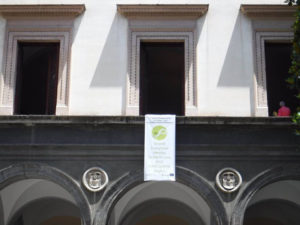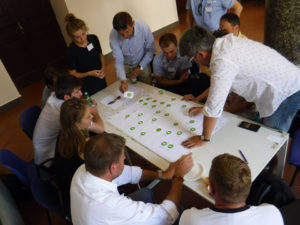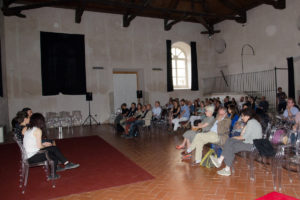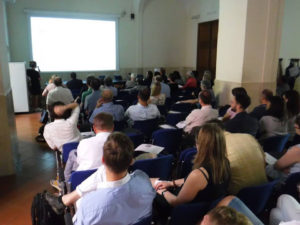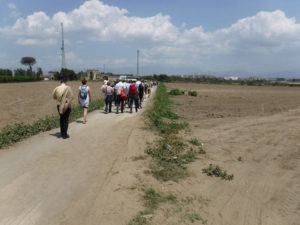2nd REPAiR Consortium Meeting, Naples, 07/08/09 June 2017
The Second Consortium meeting of REPAiR took place in Naples in Campania Region, one of the pilot cases of REPAiR.
The aim of the meeting was three-fold:
- To share and discuss the methodological developments concerning spatial and material flow analyses, LCA (Life Cicle Assessment) based sustainability assessment and development of Eco-innovative solutions;
- To develop a better and shared understanding of the concept of wastescape;
- To deeply understand the challenges towards a better waste management and circular economy in the Campania Region.
Almost 80 people including project partners, external key stakeholders, and members of the REPAiR User Board (UB) participated in the meeting. In parallel to the consortium meeting, the second part of the first REPAiR international student workshop, with more than 30 students attending, also took place.
Follow this link for a detailed program of the consortium meeting and student workshop.
Below is a short summary of the activities with links to the presentations:
Wednesday 7 June 2017- International Student Workshop
Introduction to the workshop by Libera Amenta, Anna Attademo, Gilda Berruti, UNINA researchers, followed by a lecture by two confiscated assets recovery experts (Semonella and Diana Architecture).
Thursday 8 June 2017 – Consortium Meeting in the historical location of Palazzo Gravina
Welcome by P Michelangelo Russo and the Director of the DiARC Prof. Mario Losasso, and greetings by Donata Vizzino from Campania Region Authority.
- Thematic sessions:
- WP 5 – Michelangelo Russo on eco-innovative solutions
- WP 3 – Bob Geldermans: Towards a handbook of integrated analyses with contributions by:
- Maria Cerreta/ Enrico Formato on mapping wastescape;
- Carolin Bellstedt/ Janneke van der Leer: Activity-based spatial material flow analyses.
- WP 2 – Jens-Martin Gutsche: State of the development of the Geodesign Decision Environment
- WP 4 – Sue Ellen Taelman: Preliminary sustainability framework for testing the GDSE
- Field Trip:
In the afternoon the consortium visited a confiscated asset in the Metropolitan Area of Naples and the Royal Palace of Carditello. The first stop has seen the involvement of the social cooperatives who are managing the asset, in order to get ideas on the potential of wastescapes recovery, and of local politicians, involved in peri-urban living labs (PULLs).
At the Royal Palace of Carditello, the director Soprintendente Angela Tecce guided the consortium through the building.
External expert lectures and a seminar led by three expert: an agronomist (Dott. Antonio Di Gennaro), a monumental site expert and a social cooperative (NCO, also in charge of the all three days catering), all working on the Metropolitan Area of Naples wasted landscapes.
Friday 9 June 2017
Address by Dr. Laura Petrov, EASME – EU Project Advisor.
- Thematic sessions:
- WP9 – Prof. Judit Tímár – Equal Opportunities Approach
- WP5/WP6 – Maria Federica Palestino – Lecture and workshop on involving stakeholders and User Board in Peri-urban Living Labs. With contributions from:
- Andreas Obersteg Deliverable 6.1 Decision landscapes in both pilot studies.
- Hilde Remoy: A first timeline for the two pilot PULLs, Amsterdam and Naples.
- Maria Cerreta: Introduced the workshop to define first eco-innovative solutions that we carried out during the session.
- WP 5 – Key challenges towards a more circular economy in the two pilot cases with contributions from:
- Eveline Jonkhoff from the City of Amsterdam;
- Joost Faassen from the Municipality of Haarlemmermeer;
- A.P.N.A;-Siestema Ambiente Provincia di Napoli;
- Del Giudice, Deputy mayor of the Municipality of Naples;
- WP7/WP8 Viktor Varù and Denis Cerić: Detailed Dissemination Plan and knowledge transfer strategies.
- Student Presentations:
- The student groups presented their work of the last two days; their results and consequences for REPAiR were discussed by the REPAiR team
Closing Remarks
Alexander Wandl stressed that the consortium developed a common language and the disciplinary boundaries, and that related communication and methodological differences are by now largely overcome. In both pilot case studies, the project was well received and is perceived by (key) stakeholders as very important. There is wide support for the PULLs. The pilot PULLs are well defined
Alexander thanked Michelangelo and the whole UNINA team for the excellent organisation of the consortium meeting and all the participants for their contributions.



